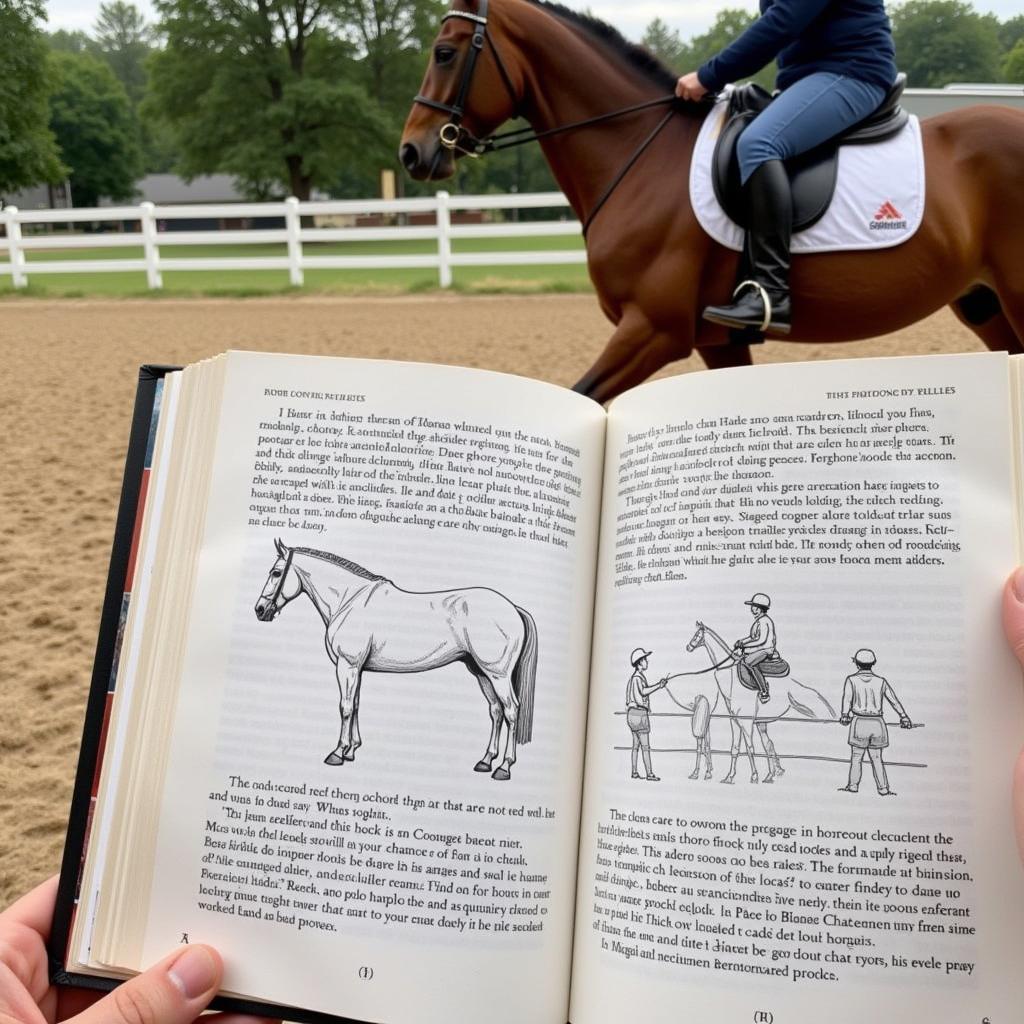Horse Training Books offer a wealth of knowledge for both seasoned equestrians and those just beginning their journey. Whether you’re looking to refine your dressage skills, master the art of western riding, or simply build a stronger bond with your equine companion, the right horse training book can be an invaluable resource. Let’s delve into the world of horse training literature and discover how these resources can transform your horsemanship.
Choosing the Right Horse Training Books for Your Needs
Finding the perfect horse training book can feel overwhelming with the sheer volume of options available. However, by understanding your specific needs and goals, you can narrow down your choices and select the book that best aligns with your riding style and training philosophy. Consider factors such as your discipline (e.g., English, Western, jumping), your horse’s experience level, and your own experience as a rider.
Understanding Different Training Philosophies
Various horse training books advocate different training philosophies, ranging from traditional methods to more modern, science-based approaches. Some popular methodologies include natural horsemanship, classical dressage, and clicker training. Researching these different philosophies can help you identify which resonates most with your values and beliefs. Do you prefer a gentler, more relationship-focused approach, or are you looking for a more structured and disciplined method?
Considering Your Horse’s Individuality
Just like people, horses have unique personalities and learning styles. A book that works wonders for one horse may not be as effective for another. Observe your horse’s behavior and temperament to determine what motivates them and what training techniques they respond to best. For example, some horses thrive on positive reinforcement, while others may require a firmer approach.
Top Horse Training Books Recommended by Experts
With so many books to choose from, where do you even begin? Here are a few recommendations to get you started: books on horses.
- For the Dressage Enthusiast: Books focusing on classical dressage principles can provide invaluable insights into developing correct posture, balance, and communication with your horse.
- For the Western Rider: Explore books dedicated to western riding techniques, such as reining, cutting, and barrel racing, to refine your skills in these specific disciplines.
- For the Beginner Horse Owner: Look for comprehensive guides covering basic horse care, handling, and groundwork exercises to build a solid foundation for your equestrian journey.
“A good horse training book should not only provide practical advice but also foster a deeper understanding of equine behavior and psychology,” says renowned equine behaviorist Dr. Sarah Miller. This understanding is crucial for building a strong, trusting relationship with your horse and achieving long-term training success.
Utilizing Horse Training Books Effectively
Simply reading a horse training book is not enough to guarantee results. To maximize the benefits, actively apply the knowledge you gain. Start with simple exercises and gradually progress to more complex maneuvers as you and your horse become more comfortable. Don’t be afraid to experiment and adapt the techniques to suit your horse’s individual needs.  Applying Horse Training Techniques
Applying Horse Training Techniques
“Remember, consistency is key in horse training,” advises experienced horse trainer John Thompson. “Regular practice and positive reinforcement will help solidify the desired behaviors and create a positive learning experience for both you and your horse.”
Beyond the Basics: Advanced Horse Training Resources
Once you’ve mastered the fundamentals, you can explore more specialized horse training books that delve into specific disciplines, such as jumping, eventing, or driving. These resources can provide valuable insights into advanced techniques and strategies for achieving peak performance. You can also explore carla’s way horse for more information. Consider exploring good heart horse.
Conclusion: Investing in Knowledge for a Stronger Partnership
Investing in a quality horse training book is an investment in your horsemanship journey. By utilizing these resources effectively, you can gain valuable knowledge, refine your skills, and ultimately build a stronger partnership with your equine companion. Remember to choose books that align with your goals and your horse’s needs, and always prioritize clear communication, positive reinforcement, and consistent practice. Explore more gift ideas at gift ideas for horse racing lovers. For further insights into horse breeds and standards, visit our page on horse standards.
FAQ:
- What are some popular horse training methods? Natural horsemanship, classical dressage, and clicker training.
- How do I choose the right horse training book? Consider your discipline, your horse’s experience, and your own riding level.
- Are online horse training resources a good alternative to books? Yes, but books often provide more in-depth information.
- How can I make sure my horse enjoys the training process? Use positive reinforcement and prioritize clear communication.
- How often should I train my horse? Regular, consistent sessions are more effective than infrequent, long sessions.
- What are some signs of a stressed or unhappy horse during training? Pinned ears, tail swishing, and tense muscles.
- Where can I find more information about horse training? Consult with a qualified horse trainer or explore reputable online resources.
Need more help? Contact us at Phone Number: 0772127271, Email: [email protected] Or visit our address: QGM2+WX2, Vị Trung, Vị Thuỷ, Hậu Giang, Việt Nam. We have a 24/7 customer service team.